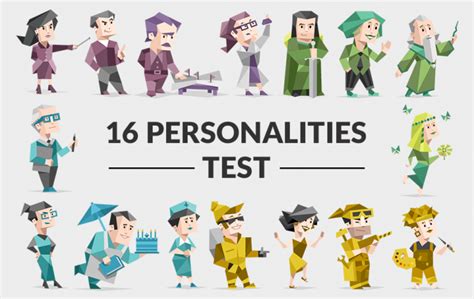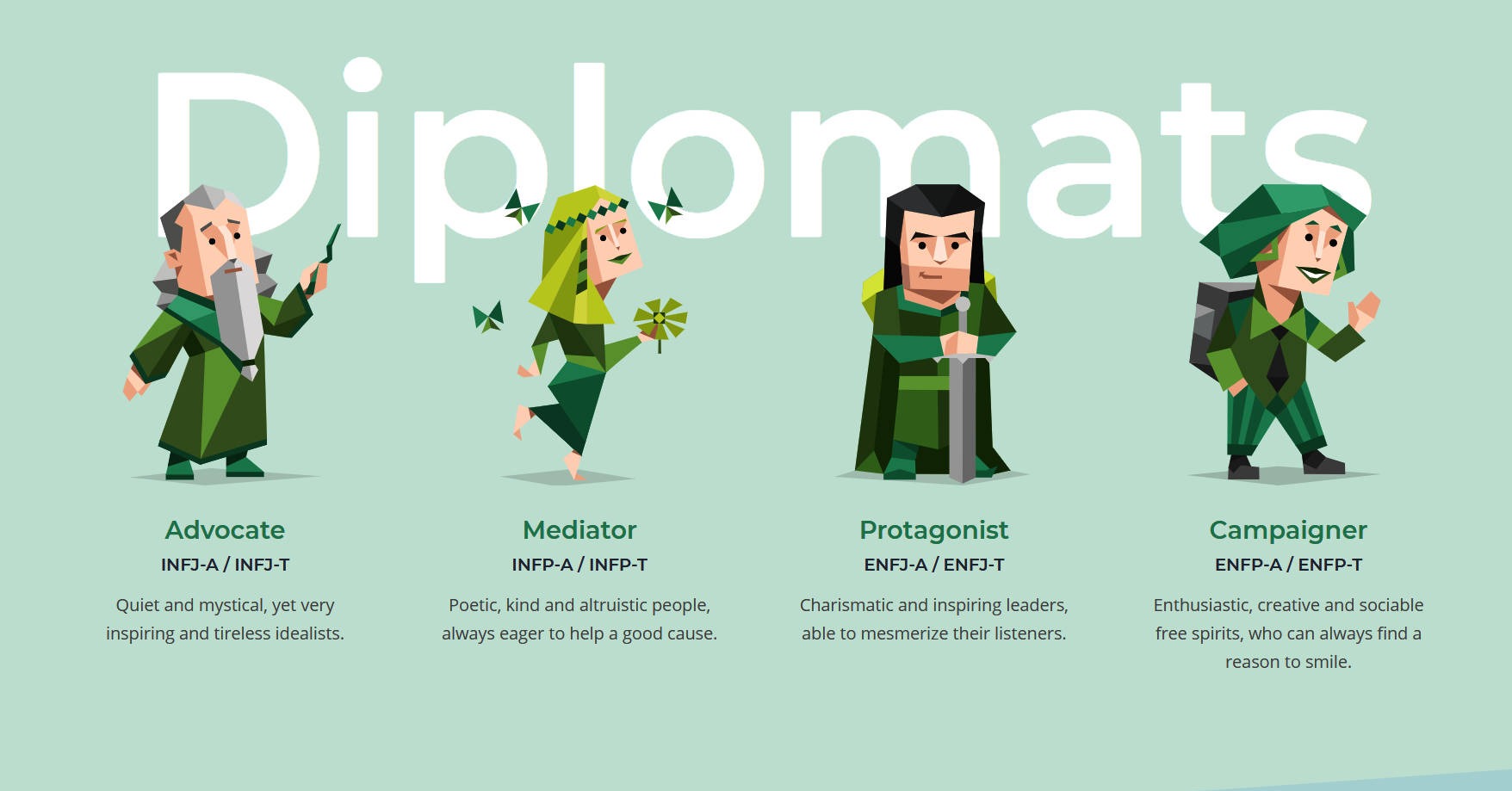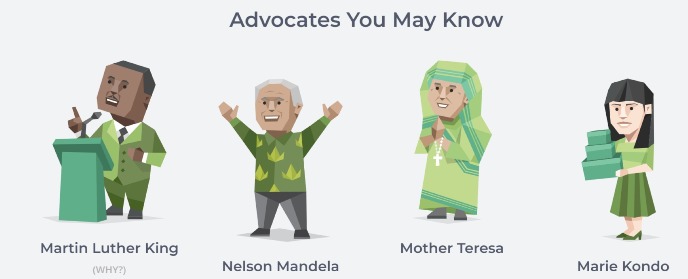Does your personality make you a leader? A study of GRL student’s personality types

What do Barack Obama, Oprah Winfrey, Malala Yousafzai, Harrison Ford and Malcom X have in common? All of them are considered to be natural born leaders according to the 16 personalities test. They are ENFJs or ENTJs, protagonists or commanders, two personality types that are very commonly associated with leadership based on trait theory. But can your personality make you a leader or not? That is a question that I want to explore in this blog post, based on a study I did on personality types among Global Responsibility and Leadership (GRL) students. But before I come to my study, its results and discussion, I want to give you some theoretical background on the measurement tool that I incorporated in my little study. So if you are just reading this to see the results, go ahead and skip the theory ;).
Theoretical background

Leadership and what makes a good leader has been studied for centuries and so far no objective truth has been found. Similar can be said about the study of personality, a topic that has even evolved into its own sub-category of psychology, personality psychology. Many theories have evolved so far, some of them based on the assumption that there are certain character traits that make us who we are. Traits that might even be testable.
One of the many personality tests out there ist the “16 personalities” test. A measurement tool created to give insight into how people might behave according to certain character traits. It is based on a combination of Jung’s theory of personality types and the Big Five Personality Traits theory which is commonly used in contemporary personality psychology. The developers of the “16 personalities” test created their own model, the NERIS model, to overcome the often criticised lack of measurability and scientific validation of the Jungian theory and the Myer-Briggs 16 personality theory. They thereby combine a type-based with a trait-based approach.
For those of you who enjoy labels or categories for their simplicity to compare yourself to others, or understand yourself better, the test uses an acronym format where each test result falls into a certain category based on roles (goals, interests and activities) and strategies (prefered ways of achieving our goals). And for those of you who find being put into categories restrictive or are familiar with the term ambivert (someone who falls in the middle of the extra-introversion scale), the developers of the test reworked the dimensions of the Big Five personality model.
When doing this particular test, your result will give you an indication of where you might fall on each of the five spectrum categories:
Mind: Introversion - Extraversion → How do you interact with others
Energy: Observant - Intuitive → How you see the world and process information (do you consider yourself more practical or imaginative?)
Nature: Thinking - Feeling → How you make decisions and deal with emotions (do you put your focus more on logic or emotion)
Tactics: Judging - Prospecting → How you approach work, decision making and planning (do you prefer predefined structure or improvising?)
Identity: Assertive - Turbulent → How confident you are in your decisions and abilities.
Next to that, the test will assign you into one of the four roles relating to your goals, interests and preferred activities:
Analysts (rather intuitive and thinking) → being rather rational and impartial
Diplomats (rather intuitive and feeling) → being rather empathetic and cooperative
Sentinels (rather observant and judging) → being rather cooperative and highly practical
Explorers (rather observant and prospecting) → being rather spontaneous
Depending on how you fall in the rest of the spectrum categories, you will be assigned one of the 16 personality types out of those 4 role groups.
Now I could go on and on about the theoretical and scientific aspects and technicalities of the test but I do not want to bore those of you who are desperately waiting to read about the study I conducted on GRL students. If you want to dive deeper into the topic and the discussions on it, do some research, check out the resources on the 16 personalities website, or ask me!
About my study
Having talked so long about the background on the test, you might be curious why I elaborated on this. A couple of months ago, while having a class on “Psychological Perspectives on Leadership and Organisations” (PPLO), I got carried away by the question of whether personality can actually have an influence on a person’s tendency toward leadership behaviour. I wondered whether GRL students might show a higher share of personality types that are considered by the ‘16 personality’ test to represent those of natural-born leaders. Therefore, I prepared and sent out a survey to all current GRL students asking them to do the ‘16 personality’ test and report back their result to me via the survey. After only a couple of days I got an overwhelming count of 109 responses (of around 200 GRL students)!
Are you also green? Looking at the results

Now let's have a look at the results! They look very green, don't they? This is because almost 70% (69.7%) of the 109 GRL students that responded to the survey indicated a personality type that falls into the category of “Diplomats”, while worldwide less than 14% do. But does that say anything about leadership yet? Not necessarily, still it is surprising to see that almost 70% of GRL students fall into the same category.
“These personality types [diplomats] believe it is possible to create a kinder world, and they strive to do so every day”
If you ask me, this quote represents quite well the sentiment of a big majority of people within the study of GRL and our Campus in general! And maybe diplomats do not fall that far from leadership afterall, because isn’t striving for a better world a desirable quality in a leader?
But not only this result was surprising to me. When I contacted the 16 personalities team asking if they could share with me the distribution of personality types worldwide, they said that according to their calculations “Advocates” make up less than 1 percent of the world population, making it the rarest personality type worldwide. However, of the GRL students surveyed an overwhelming 14.6% responded to fall into the category of “Advocates”!

“Advocates leave their mark on the world. They have a deep sense of idealism and integrity, but they aren’t idle dreamers – they take concrete steps to realise their goals and make a lasting impact.”
And reading this, I am not surprised by the results. In this quote I recognize many of my fellow students! Again, in the role description of Advocates, the term leadership does not definitely appear. Still I would argue that the qualities described in the quote above (idealism, integrity, making a lasting impact) would be desirable for a leader or would you think differently?
Zooming closer onto the topic of leadership, let’s have a look at the two personality types that are said to be prone to natural-born leadership (according to the 16 personality test): Protagonists and Commanders. Do GRL students’ personality types match their decision to follow a study on responsible leadership?
It seems so, as almost a third (30.3%) of the respondents reported that they got assigned one of the two leadership personalities! This again is an interesting result, as the distribution worldwide indicates a share of only 2% Protagonists and 3% Commanders! Do GRL students overly show leadership qualities (and what are leadership qualities anyway)?
Are we really born to be leaders?
Based on the prognoses of the “16 personalities” test for certain leadership styles and the results of my studies, it could seem that personality might actually play a role in whether a person is a leader or not. However, I believe that we should be careful jumping to conclusions too quickly! First of all, there is a high possibility that my research has been biased leading to a self-fulfilling prophecy of my hypothesis. Because I already expected certain personality types to appear more often in my studies, I might have given away that expectation by already saying that I want to analyse a possible correlation between personality and leadership when sending out the survey. That could have biassed people to answer in a certain way. Another limitation is the effect of self vs. external perception. People that are studying a study directed to leadership might see themselves already as change-makers or want to become leaders and will answer accordingly. Since self-reported tests are often prone to self-serving bias, I would therefore advise anyone to not only take the test yourself but also let a person that knows you well take it for you and see what results they get!
Lastly, I also like to mention that in the end this test is simply an indicator of how people with a certain personality might act but it is no guideline, excuse or answer to your behaviour, your abilities and your potential! For example, a leader in the field interviewed in the frame of my PPLO course told us that certain personalities do not necessarily make you a better leader. People could learn to “stretch to the other side” and work on their weaknesses. If you are rather introverted and find speaking in front of a team or crowd overwhelming, you can learn to play the role of an extrovert in your job and leadership training can help people practise this. And just because your personality “says so”, or you study leadership, that does not mean that you in the end have to become one.
Therefore, do not let a category limit your ambitions, dreams and undertakings! Looking at where you fall in the spectrum of the five different scales might give you some insights into yourself. But take it or leave it. If or what you want to do with that information or if you even want to know or believe it is completely up to you!
Some concluding remarks
Leaders, are they born or made? This is a question that has been highly debated among people interested in leadership. And so far there has not been conclusive and definite evidence proving either side of the claim false or true. I do not want to go into the details of this debate here but I find it interesting to think about this in the light of the GRL studies. Can a study make people leaders or are you just a leader or not? What do you think? And what makes a (good) leader for you?
About the author

Hey, I am Julia, 19 years old and I am currently a second-year student of the BSc Global Responsibility and Leadership majoring in Responsible Governance and Responsible Humanity. I grew up in Germany being one of the lucky few that could already take psychology in high school. This has sparked my interest in psychology! I am a very curious person and always like to explore new topics which is why I did this little spontaneous study on my peers! (j.gorny.1 student.rug.nl)

